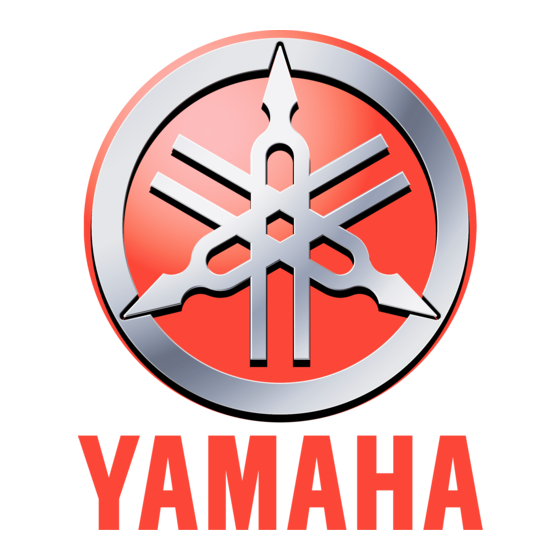Yamaha CPX900 Manual do utilizador - Página 20
Procurar online ou descarregar pdf Manual do utilizador para Instrumento musical Yamaha CPX900. Yamaha CPX900 24 páginas. User guide
Também para Yamaha CPX900: Brochura (1 páginas)

L Series Common Features
Tuners
Cutaway Body
1
3
The vintage style brass tuners
Venetian cutaways offer access
found on all #26 model guitars
to the upper frets while adding
present these instruments with
beauty to these fine instruments.
a classic look.
5 ply
3 ply
Multi-Ply Neck Designs
2
The five-piece necks on the #36 and #26 models are carved from
a single laminated block that features two layers of padauk—an
extremely hard wood used for marimba tone bars—sandwiched
between three layers of mahogany. This design creates a neck that
is exceptionally strong and stable—great for those players who
prefer low string height. The #16 and #6 model instruments utilize
similar 3-ply design of rosewood between two layers of mahogany.
Hard case (#36/#26)
Form case (#16/#6)
Cases Offer Outstanding
Support and Protection
Newly developed hard and form cases are designed to pro-
vide your L-Series guitar with excellent support and protec-
tion. They offer a stress-free environment that will extend
the life of your valuable instrument while keeping it safe.
39
Yamaha Acoustic Guitars
1
Square Frame Bracing
L series original Bracing Designs
4
All L-series guitars benefit from a new non-scalloped bracing
design that delivers tone that is thick and well focused.
The #36 and #26 model instruments add a square bracing
design which utilizes side braces to connect the brace clos-
est to the sound hole on the top, to its opposite brace on the
back. This arrangement transmits string resonance to the
back much quicker, causing the entire instrument to come
alive with bass response, which the player feels as well.
2
LL
LS
Body Selection
5
Whether you prefer a full-sized LL original jumbo, small
3
sized LS body , or medium jumbo-sized LJ, the choice is
yours. Each of these body styles is represented in each class
letting you choose the instrument that meets your require-
4
ments for sound, style, and affordability.
5
6
Bridge
6
The bridges on all new L-Series guitars offer
more overall mass than their predecessors to
deliver greater tone from these instruments.
Their designs feature smooth lines and edges
to keep the playing surface unencumbered.
A.R.E. (Acoustic Resonance Enhancement)
A.R.E. (Acoustic Resonance Enhancement) is an original wood reforming technology developed by Yamaha.
Instruments made with woods processed with this technology produce a tonal richness that is like vintage
instruments that have been played for years. This technology is currently applied to the tops on L Series 6
model acoustic guitars (pages 28,29,30) and LX Series 9 model acoustic electric guitars (pages 6,7,8).
A.R.E technology uses precision controlled humidity and tem-
perature to manipulate the molecular properties of the wood
into a more acoustically ideal condition (similar to the mo-
lecular characteristics of woods in instruments that have been
played for years). The process is chemical free making it an
environmentally friendly process as well.
The graphs shown below are from actual acoustic spectral measurements taken under controlled conditions with a current
L series guitar and a new L series guitar with A.R.E.
Notice the enhanced low range sustain and improved high range attack on the A.R.E. guitar. It is also clear that high range
dissonance has a shorter delay after the attack. This is hard proof that A.R.E. is effective at producing the desired changes
in the wood's acoustic characteristics. These instruments have received high marks from a great number of musicians.
Most of their evaluations are identical to evaluations for guitars that have been played for years. Comments such as "ex-
cellent resonance", "warm", "mature", "well settled", and "clear" were common terms used in the evaluations.
LJ
Normal Guitar
0
−40
−60
−120
0
0.1
0.2
0.3
Time [s]
0
Accessories
YT-150
YT-250
GUITAR/BASS AUTO TUNER
CHROMATIC TUNER
Yamaha tuners offer quick and accurate tuning of your instruments. Tuners are equipped with built-in microphones for easy tuning,
or electric instruments can be connected directly to the tuner. Easy to read indicators facilitate quick and accurate tuning.
The following alterations lead to their corresponding acousti-
cally ideal conditions.
• Enhanced low range sustain produces rich sound and thick tone.
• Increased high range response and decay produces a
sharper tone and simultaneously controls dissonance.
A.R.E. Guitar
(Current L Series)
(New L Series with A.R.E.)
0
40
-40
60
-60
-120
80
0
0.1
100
0.2
120
0.3
10
Time [s]
5
0
15
140
10
Frequency [kHz]
5
Enhanced low (mid) range
Increased high
Frequency [kHz]
sustain, increased power
range decay
Volume increases as the color changes to red,
and decreases as the color changes to blue.
YT-100
QT-1/QT-1B/QT-1BR
GUITAR/BASS AUTO TUNER
QUARTZ METRONOME
• Indicators: Pitch indicator, Tuning guides
• Tuning Notes: GUITAR 7B, 6E, 5A, 4D, 3G, 2B, 1E
BASS LB, 4E, 3A, 2D, 1G, HC
• Input: Input jack(6 monaural), Built-in microphone
• Power Source: Two AAA(R03/LR03) batteries
• Dimensions: 97(W) X 50(H)X 18(D)mm (3.8" X 2.0" X 0.71")
QT-1
The QT-1 quartz metronome offers soft or bright sound settings, volume control and a flashing
LED atop its unique design. Tuning notes over a one octave range are provided in half-step
increments with adjustable standard pitch.
• Patents already registered
Japan Patent # 3562517
United States # US6667429 B2
and other countries
• Patents Pending
Europe (20 countries)
Enhance high range
response Range
40
60
80
100
120
15
140
QT-B Rear Panel
QT-1B
QT-1 brown
Yamaha Acoustic Guitars
40
